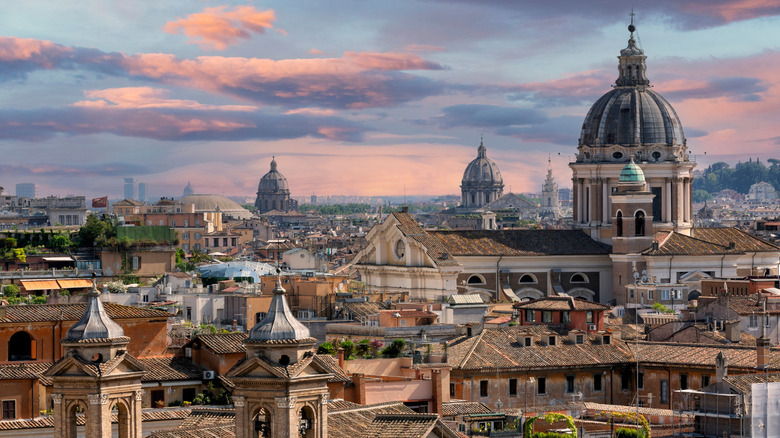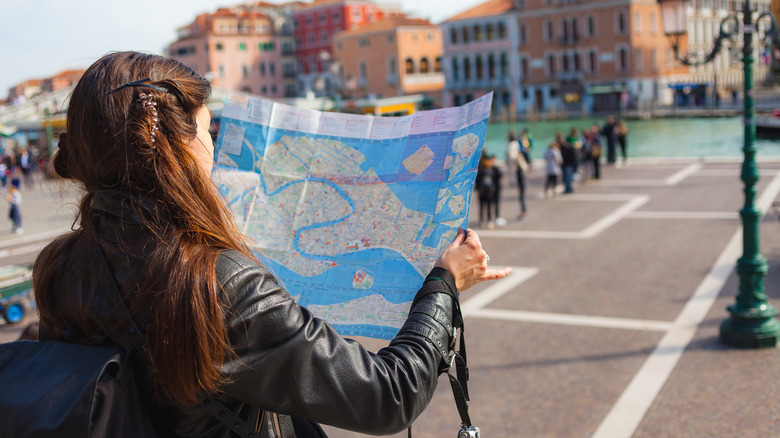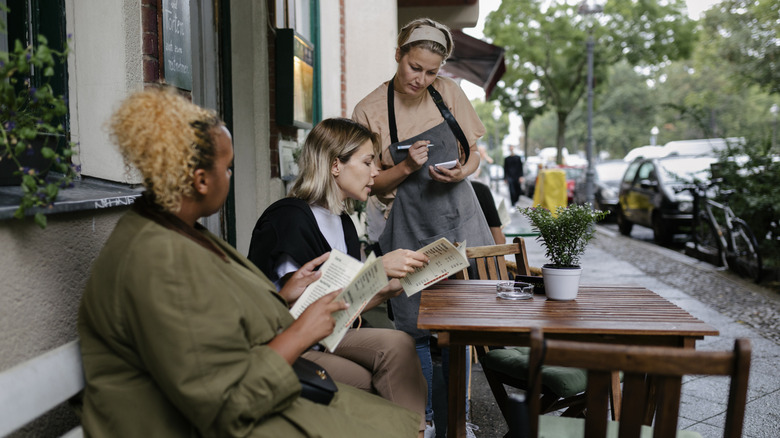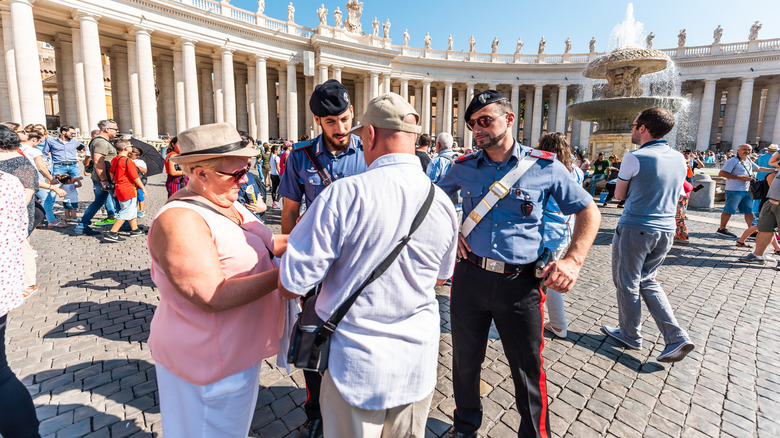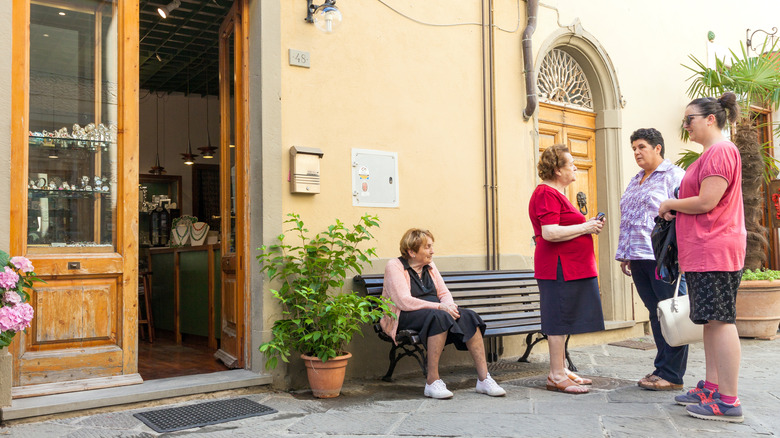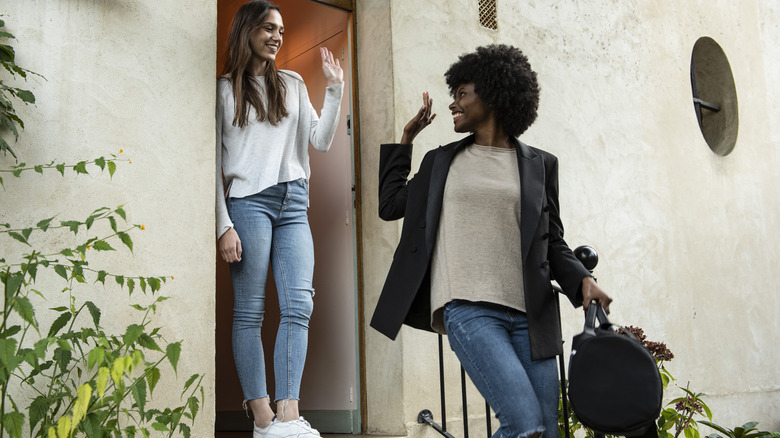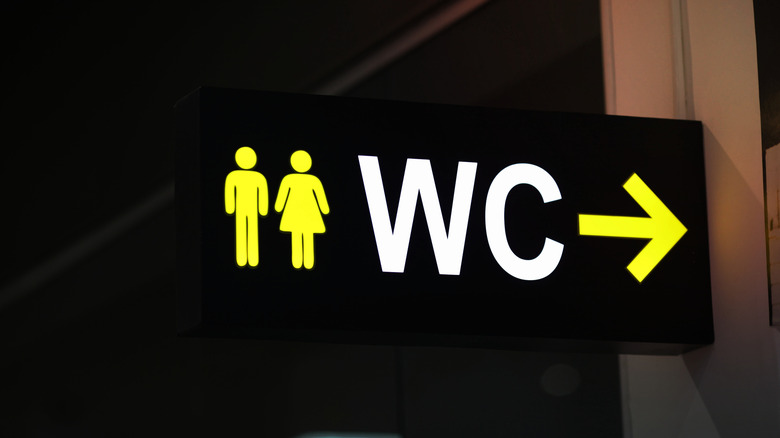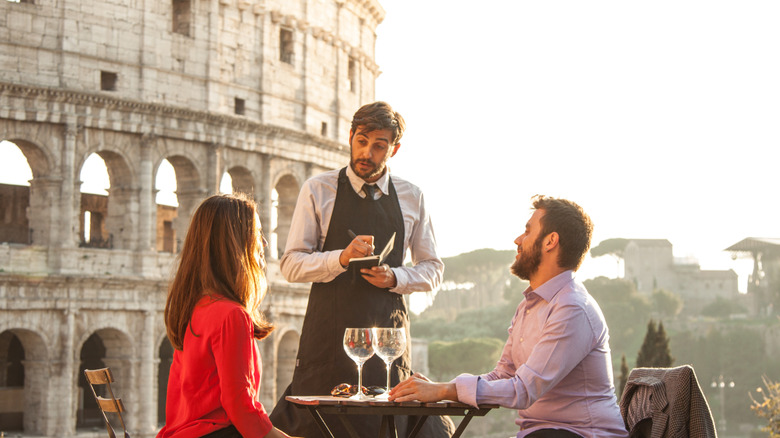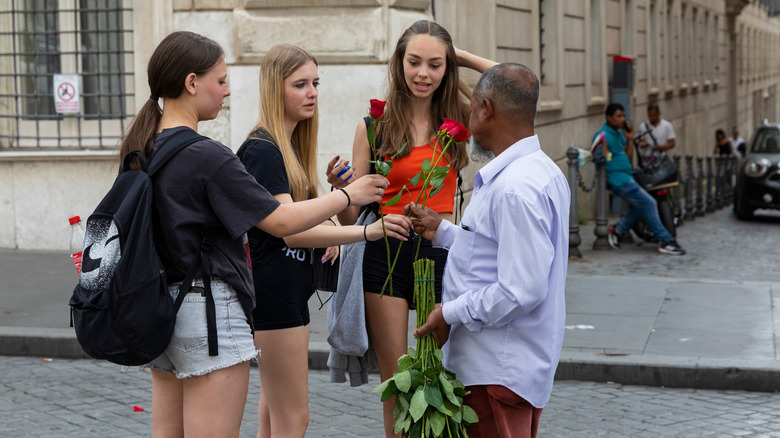Essential Words And Phrases You Should Know Before Visiting Italy
Don't worry: Even if you don't speak Italian fluently, you'll be able to get by on a vacation to Italy just fine. Plenty of people know English, especially in the areas that are most popular with international tourists. However, that doesn't mean you shouldn't have a few words of Italian in your back pocket. This is especially true if you want to take part in passeggiata, a local practice Rick Steves has identified as the best and most fun way to communicate with locals. If nothing else, people may feel gratified that you made an effort — even if you mess up the pronunciation or speak using toddler-level language.
Sometimes it's hard to know what words would be most useful. Sure, if you were trying to learn Italian for real and had plenty of time to practice, you could figure out how to say pretty much anything. But these are going to be your emergency words, the simple phrases that have a surprisingly strong conversational lift. Memorize the words on this list, and you'll increase your chances of coming across as polite, friendly, and maybe even a little bit cultured.
Dov'è
If you're going on vacation in Italy, sooner or later you're going to get turned around and need to ask for directions. "Dov'è" means "where is" in Italian, and is pronounced "doh-VHEY." It has a lot of uses. You can combine "Dov'è" with the name of the place you're trying to go to (or point on a map if you can't pronounce it properly) or pair it with helpful nouns like "la stazione ferroviaria" (train station), "la chiesa" (church), or "il ristorante" (restaurant) for bonus points. Look at you — you're already saying sentences!
Vorrei
When you go to a restaurant, you can always just point at the menu or say the name of the dish you're interested in ordering. But if you want to put in a little more effort, use the word "vorrei" — it means "I would like," as in "Vorrei la pasta" or "Vorrei la pizza margherita." Sure, there's a good chance the waiter will switch to English as soon as you open your mouth, but that doesn't mean you didn't technically order your food in Italian. Looking for quality dining options that won't blow your budget? Check out these five types of places to eat in Italy.
Grazie
If there's one thing to know about traveling internationally, it's that a little politeness goes a long way. As such, a simple "thank you" is one of the most important tools in your tourist arsenal. In Italy, you would say "grazie" (with a little bit of an "eh" on the e). Alternatively, you can really commit with "grazie mille" — it technically means "a thousand thanks," but is pretty much just a substitute for "thank you very much."
Aiuto
Hopefully you won't need to use this word on your next trip to Italy (especially if you avoid the country's most dangerous destinations), but it's a good one to have in reserve just in case. "Aiuto" means "help" in Italian, and if you're ever in a dicey situation, saying it assertively should get people's attention. Even if your limited Italian means you can't go into details about why you're in need of help, it's probably one of the words passerbys are least likely to ignore.
Quanto costa?
What's a trip to Italy without a little shopping, right? "Quanto costa?" is a useful expression to have, because it means "How much is it?" or "How much does it cost?" Although a lot of shops will have tags on items, meaning you won't need to ask a sales associate about the price, it's still an easy-to-remember phrase that will help in smaller, independent stores or the odd restaurant without prices listed. After all, it's better to ask than pay with your credit card and be shocked at the price later. You'll especially want to keep this question primed in the fashion-centric Milan, Italy's most underrated city, according to Rick Steves.
Numbers 1-10
What's one of the first things that kids learn in school? To count to 10. Basic numbers are an invaluable thing to know in another language, and Italian is no different. Although it's also helpful to know the tens places (you know, 20, 30, 40, etc), learning all the numbers up to 10 is a good place to start. They are as follows: 1 – uno, 2 – due, 3 – tre, 4 – quattro, 5 – cinque, 6 – sei, 7 – sette, 8 – otto, 9 – nove, and 10 – dieci.
Per favore
You know that expression about catching more flies with honey than vinegar? It's true, especially when you're a tourist and you have only a few interactions to make a good impression. So "please" is an important word to employ in pretty much any conversation you might find yourself in. Add "per favore" to your requests, and you'll find that people might just be a little more amenable to helping you out. It certainly can't hurt!
Parla inglese?
Yes, some Italians speak at least passable English, especially in the major cities and tourism industry. But at the same time, it's better not to assume that everyone speaks your language. Especially if you're outside the main tourist sites, it's a good idea when you approach someone with a question to ask "parla inglese?" or "do you speak English?" rather than just launching rapid-fire into whatever you were going to say. You also may want to brush up on key unspoken etiquette rules before attempting to start a conversation with any locals in Italy to avoid committing an additional faux pas.
Ciao
"Ciao" is a great multi-use word which means both "hello" and "goodbye" in Italian. It's one of the foreign greetings that English-speakers are most familiar with (plenty of Americans use it to say goodbye), so it's a good option when you're on autopilot and desperately trying to cling to one of the few Italian words you know. For greetings that are more specific to the time of day, you can use "buongiorno" in the morning and afternoon, "buona sera" in the evening, and "buona notte" at night.
Il bagno
It's inevitable that at some point during your trip to Italy you're going to need to use a restroom while out and about. But what happens if you can't find one? Well, it's an easy enough question to ask. We already have the phrase "dov'è" under our belt, which you'll remember means "where is?" All you have to do is tack on "il bagno," and someone will point you in the right direction when nature calls.
Scusa
"Scusa" comes in handy for any situation where you need to get someone's attention. It means "excuse me" or "pardon me," and you would use it before asking someone a question. For example, if you had to stop someone on the street to ask for directions, you would start the interaction by saying "scusa," because that's just polite. It's also helpful in situations where you need to offer up a light apology, like if you bump into someone on a Venetian vaporetto.
Mi dispiace
Although you're going to be on your best behavior while in Italy, it's still entirely possible that you might do something wrong. We're only human, after all. So when you need to apologize in Italian, you can use "mi dispiace." Accidentally clip someone with your rented bicycle? "Mi dispiace" is in order. This is also a great way to express sadness in a situation where you need to tell someone that you're sorry that their mom is sick, their boyfriend broke up with them, they didn't get a promotion at work, et cetera.
Sono allergico a
To be fair, this one's only important if you have allergies — and if you do, then it's really important. If you're going to be dining out with a serious allergy, you're going to want to make sure you don't inadvertently eat something that's going to make you sick. Look up the Italian word for the thing you're allergic to and combine it with "Sono allergico a," which means simply, "I am allergic to."
Mi chiamo
It's not outside the realm of possibilities that you'll be asked to introduce yourself at some point while on vacation in Italy — it might even be one of the first things you do when you check into your hotel. "Mi chiamo" means "my name is" in Italian, and if you're a relatively social person, you'll likely get a lot of mileage out of it. Note that the "ch" sound in "chiamo" is pronounced like a k, so you would say "kee-ah-mo," not "chi-ah-mo."
Sì and no
And finally, here are the most fundamental phrases you will need to know: A simple "yes" or "no." These words are worth their weight in gold when it comes to basic communication, and if you can pair them up with a nice "grazie," you're already in good shape for your next trip. Part of the beauty here is that there's no need to reinvent the wheel, because "no" in Italian is the same as in English, and "sì" is easy enough to remember for "yes," especially if you're already familiar with Spanish. "No, grazie" is particularly useful for fending off any scammers trying to offer "free" roses to tourists in Italy.
